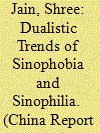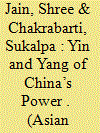|
|
|
Sort Order |
|
|
|
Items / Page
|
|
|
|
|
|
|
| Srl | Item |
| 1 |
ID:
189229


|
|
|
|
|
| Summary/Abstract |
The People’s Republic of China has invited both fascination and fear, admiration and contempt in the last few years. Various public opinion surveys’ data findings reveal a nuanced and conflicted phenomenon of ‘Sinophobia’ and ‘Sinophillia’ across the world nations. One view of China is that of an ‘autocratic,’ ‘anti-democratic’ regime provoking anxiety and suspicion reflected in a trending wave of anti-China sentiments evolving into ‘Sinophobia,’ with its prevalence and intensity highlighted in increasing cases of racism and violence towards immigrant Chinese after the novel coronavirus outbreak. The growing intensity of Sinophobia is noticed in countries witnessing a barging influx of Chinese investment with Chinese land grabs and the loss of native jobs. However, another view is of a nation that inspires vast admiration for its economic ascent and traditional culture. Today, China has an increasing appeal and attraction not just for its economic engagement but also for its culture, language and tourism.
|
|
|
|
|
|
|
|
|
|
|
|
|
|
|
|
| 2 |
ID:
190077


|
|
|
|
|
| Summary/Abstract |
The Pew Research Center survey reports an increasing unfavorable view of China worldwide. In the Soft Power 30 index, China fares at a rank of 27th, far behind its aim of global leadership. The world’s leading economic power (in terms of purchasing power parity), a military power second only to the United States, a nation with a formidable global presence, a robust civilization and culture, however, still struggles to generate international affinity and credibility one might expect of the great middle kingdom. Acknowledging the benefits of soft power, China has continuously been engaged in the competitive politics of attraction, legitimacy, and credibility; however, Beijing’s charm offensive still has limited appeal in the outside world. The popular assessments point toward China’s authoritarian political model or poor state of civil liberties for the limited effectiveness of its soft power push. However, in this article we argue that besides the political and ideological factors limiting its soft power, China’s absolute or relative soft power gains are majorly undercut because of its coercive diplomacy exercised with the unbridled pursuit of its core national interests and hyper-nationalism. The article provides an interpretive illustration of how China’s disposition to rely on hard power instruments of carrot (inducement) and stick (threat, coercion, or intimidation) to get desired outcomes undermines the quest and effect of its soft power.
|
|
|
|
|
|
|
|
|
|
|
|
|
|
|
|
|
|
|
|
|